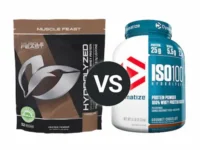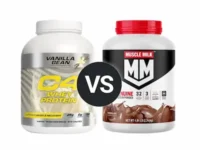Knowledge BaseYou're Questions Answered
How can I build muscle without protein powder?
Building muscle without protein powder is entirely possible and can be achieved through a well-structured diet rich in whole food protein sources, consistent resistance training, and adequate rest. While protein powders offer convenience, they are not essential if you meet your daily protein requirements through food. For most people aiming to build muscle, the recommended intake is approximately 0.7 to 1.0 grams of protein per pound of body weight (1.6 to 2.2 g/kg)1.
Whole Food Protein Sources
You can support muscle growth by incorporating a variety of high-protein whole foods into your diet:
- Animal-based proteins: Chicken breast, turkey, lean beef, eggs, fish (like salmon and tuna), and dairy products (such as Greek yogurt and cottage cheese) provide high-quality protein with all essential amino acids.
- Plant-based proteins: Lentils, chickpeas, tofu, tempeh, edamame, quinoa, and nuts are excellent options. While some plant proteins are incomplete, combining sources (e.g., rice and beans) can yield a complete amino acid profile.
Resistance Training and Recovery
Progressive resistance training—such as weightlifting or bodyweight exercises—is critical to stimulating muscle protein synthesis. Exercises should target all major muscle groups and be performed consistently, ideally 3–5 times per week. Recovery is equally important; muscles grow during rest, not during workouts. Aim for 7–9 hours of sleep per night and include rest days to allow for repair and growth2.
Meal Timing and Distribution
Distributing protein intake evenly across meals enhances muscle protein synthesis. Aim for 20–40 grams of protein per meal, depending on your size and activity level3. Including protein-rich snacks (like hard-boiled eggs, roasted chickpeas, or cottage cheese) can also help meet your targets without relying on powders.
Caloric Surplus and Nutritional Balance
Muscle gain requires a slight caloric surplus. Prioritize nutrient-dense foods and ensure your diet includes adequate carbohydrates (for workout energy) and healthy fats (for hormone production). Hydration and micronutrients like magnesium and vitamin D also support performance and recovery.
In Conclusion...
You can effectively build muscle without protein powder by focusing on whole food protein sources, consistent resistance training, proper meal timing, and overall balanced nutrition. While powders are useful for convenience, they are by no means essential if your diet is optimized for your goals.
- Morton, R. W., Murphy, K. T., McKellar, S. R., Schoenfeld, B. J., Henselmans, M., Helms, E., ... & Phillips, S. M. (2018). A systematic review, meta-analysis and meta-regression of the effect of protein supplementation on resistance training-induced gains in muscle mass and strength in healthy adults. British Journal of Sports Medicine, 52(6), 376-384.
- Schoenfeld, B. J. (2010). The mechanisms of muscle hypertrophy and their application to resistance training. Journal of Strength and Conditioning Research, 24(10), 2857–2872.
- Areta, J. L., Burke, L. M., Ross, M. L., Camera, D. M., West, D. W., Broad, E. M., ... & Coffey, V. G. (2013). Timing and distribution of protein ingestion during prolonged recovery from resistance exercise alters myofibrillar protein synthesis. The Journal of Physiology, 591(9), 2319–2331.
Related Questions
Related Reviews

Your Answer
We are a participant in the Amazon Services LLC Associates Program, an affiliate advertising program designed to provide a means for us to earn fees by linking to Amazon.com and affiliated sites.



